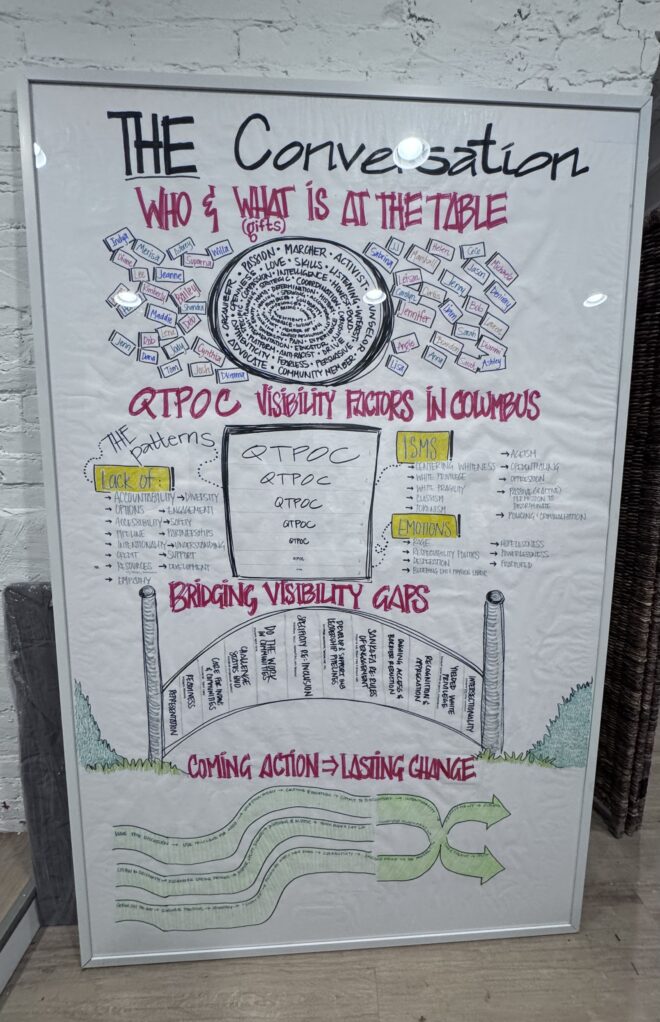By Densil R. Porteous, Executive Director, Stonewall Columbus
Pride Month is a time of joy. A time of resistance. A time of remembrance.
It’s a time when we step boldly into the streets with rainbow flags and fierce love—but also a time when we must look back with clarity and honesty about the moments that shaped our movement—the moments that brought us here.
One such moment happened here in Columbus in 2017.
That year, during the annual Pride march, four Black queer and trans activists—protesting the presence of police and the exclusion of QTBIPOC (Queer and Trans Black, Indigenous, People of Color) voices—were arrested. The incident sparked outrage and deep reflection. We came to know them as the Black Pride Four, but their names, their voices, and their message mattered far more than that label.
I wasn’t in Columbus that day. I was traveling. But even from afar, I felt the gravity of what happened. At the time, I was serving on the Board of Equitas Health, and the ripple effects were immediate. Within and beyond organizational walls, our community was pushed to reckon with itself: to confront how whiteness and power had shaped Pride spaces, and to ask what accountability and equity really looked like.
In the months and years that followed, something remarkable happened. Not perfect. Not finished. But powerful.
Community members came together to do the hard work of transformative justice.
There were circles, conversations, and truth-tellings—like the ones facilitated by Erin Upchurch and Dwayne Steward and memorialized by Kimberly Brazwell in the visually captivating piece titled The Conversation. That image, full of names, patterns, “-isms,” emotions, and bold calls for change, is not just art—it is testimony. A mirror. A blueprint.
And as difficult as that time was, it planted the seeds of transformation.
Since then, we’ve seen shifts in leadership at major LGBTQ+ institutions across our city and state, including Stonewall Columbus, Equitas Health, and Equality Ohio. Leaders who’s intersectional experiences more closely reflect the communities they serve. Leaders who understand intersectionality not as a buzzword, or concept, but as lived reality.
But let me be clear: leadership change is only one part of the journey.
Real transformation is about systems, not just individuals.
It’s about how decisions are made, who is heard, what is funded, and which histories are centered. It’s about how accessible our spaces are. How intentional our partnerships are. How we respond—not just in crisis, but in quiet, everyday choices.
At Stonewall Columbus, I walk into this work every day knowing that the past is present. I feel the weight of the 2017 moment as both caution and calling. I see the shifts we’ve made—our expanded programming, our stronger community partnerships, our ongoing commitment to equity—but I also know we are not done.
The work is ongoing. It always will be.
And that’s not a failure. That’s the truth of progress and justice. Progress isn’t a moment it’s movement—forward. Justice isn’t a destination. It’s a practice. A way of being.
So this Pride Month, I invite us all to do two things:
- Celebrate the joy. – Dance, laugh, love boldly. Our joy is resistance. It always has been.
- Stay accountable to the work. – Remember 2017. Learn from it. Name it. Carry it with you—not as a wound, but as wisdom. As a reminder that visibility without equity is not liberation. That rainbow flags without Black and Brown voices are incomplete. That Pride is protest, memory, and movement all at once.
The future we want—for all LGBTQ+ people—can only be built if we are honest about the past, brave in the present, and committed for the long haul.
Let’s keep building.
In pride, in purpose, in progress, and in power,
Densil R. Porteous
Executive Director, Stonewall Columbus




